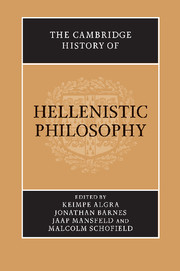Book contents
- Frontmatter
- PART I INTRODUCTION
- PART II LOGIC AND LANGUAGE
- PART III EPISTEMOLOGY
- 7 Introduction: the beginnings of Hellenistic epistemology
- 8 Epicurean epistemology
- 9 Stoic epistemology
- 10 Academic epistemology
- PART IV PHYSICS AND METAPHYSICS
- PART V ETHICS AND POLITICS
- Synopsis of principal events
- Editions of sources and fragments
- List of abbreviations
- Bibliography
- Index locorum
- General Index
- References
7 - Introduction: the beginnings of Hellenistic epistemology
from PART III - EPISTEMOLOGY
Published online by Cambridge University Press: 28 March 2008
- Frontmatter
- PART I INTRODUCTION
- PART II LOGIC AND LANGUAGE
- PART III EPISTEMOLOGY
- 7 Introduction: the beginnings of Hellenistic epistemology
- 8 Epicurean epistemology
- 9 Stoic epistemology
- 10 Academic epistemology
- PART IV PHYSICS AND METAPHYSICS
- PART V ETHICS AND POLITICS
- Synopsis of principal events
- Editions of sources and fragments
- List of abbreviations
- Bibliography
- Index locorum
- General Index
- References
Summary
The epistemological turn
It is generally agreed that the Hellenistic period is the great age of ancient epistemology. For a variety of reasons, many of which have nothing to do with the history of philosophy, the period is standardly deemed to start in 323 bc on the death of Alexander the Great. By a curious coincidence, two philosophers of signal and symbolic importance had connections with Alexander. The first is Aristotle, who had been tutor to the young Alexander and who died a year after his royal pupil, leaving a vast body of scientific and philosophical work which, after a period of mixed fortune, would for centuries be considered - in particular by the sceptics - as a model of dogmatic thought. The second is Pyrrho, some twenty years younger than Aristotle, who accompanied Alexander on his eastern campaign: he returned from Asia in his prime, and the words and deeds which filled the rest of his long life caused him, rightly or wrongly, to be regarded for centuries as the eponymous hero of scepticism.
It is tempting - and conventional - to assert that, on Aristotle's death, philosophy saw itself driven from a happy paradise of epistemological innocence, and that the poison of doubt, spat out by the serpent of Pyrrhonism, would oblige any future philosopher who failed to succumb to it to earn his neo-dogmatic bread by the sweat of his brow. And this picture makes a pleasing diptych with the picture which is painted, with equal facility, of the state of ethics: before the geopolitical earthquake provoked by Alexander, the moral existence of the Greeks had been firmly framed by the ethical and political structures of the city-state; after the earthquake, the new Hellenistic schools could offer the shaken citizenry nothing more than recipes for individual salvation.
- Type
- Chapter
- Information
- The Cambridge History of Hellenistic Philosophy , pp. 227 - 259Publisher: Cambridge University PressPrint publication year: 1999
References
- 2
- Cited by



